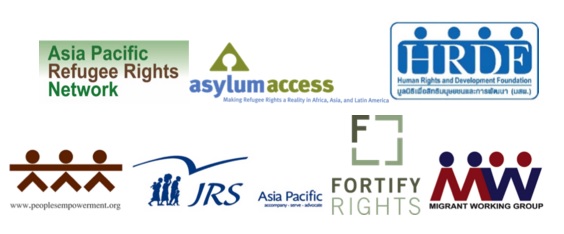The organizations today published their joint submission to the Human Rights Council. The submission outlines Thailand’s treatment of asylum seekers, refugees, and survivors of human trafficking over the past four years, highlighting numerous abuses and continuous inaction. The report provides 22 detailed recommendations for the Thai Government to improve access to human rights for refugees and asylum seekers in the country.
Principal among the recommendations is for Thailand to pass legislation to provide refugees and asylum seekers with access to fair and robust asylum procedures, legal protection, and to ratify the 1951 Refugee Convention. Since 2011, Thailand has effectively denied at least tens of thousands of camp-based asylum seekers and refugees from Myanmar access to asylum procedures. Thailand also continues to arbitrarly detain refugees and asylum seekers.
“Thailand has an opportunity to demonstrate a commitment to human rights and improve its international reputation by ensuring asylum seekers and refugees have access to legal protections,” said Amy Smith, Executive Director of Fortify Rights. “A key to minimizing the abuse, exploitation, and human trafficking of displaced populations in Thailand is recognition and protection.”
In May 2016, Thailand will undergo its second UPR—a process in which the UN Human Rights Council reviews the human rights record of member states every four years. Thailand’s last review was May 10, 2011.
Thailand is home to 3.7 million migrants, including an estimated 130,000 refugees and asylum seekers. While Thailand has hosted a substantial number of Myanmar refugees on the Thailand-Myanmar border for many years, Thailand is not a state party to the 1951 Refugee Convention and lacks domestic legislation that protects the rights of asylum seekers and refugees. As such, asylum seekers and refugees are considered to be in violation of Thailand’s domestic immigration law and are subject to detention and deportation, putting them at further risk of abuse, exploitation, and trafficking.
“While the Thai Government has made commitments to ending the immigration detention of children, this practice continues,” said Julia Mayerhofer, Interim Executive Director of the Asia Pacific Refugee Rights Network. “Children should not be detained, and we urge the Thai government to actively explore alternatives to detention in partnership with civil society.”
Urban asylum seekers, who wait an average of four years before the UN High Commissioner for Refugees (UNHCR) determines their refugee status, are particularly at risk of arbitrary arrest, detention, and refoulment by Thai authorities. The principle of nonrefoulment, which is protected under international law, prohibits States from returning a person to a country where their life or freedom may be threatened.
In 2015, Thailand handed over 109 male Uighur asylum seekers and other Chinese nationals, including individuals recognized as refugees by UNHCR, to the government of China, prompting international condemnation from human rights organizations.
Thai authorities have also long implemented a “push-back” policy, through which asylum seekers arriving by boat are not allowed to disembark and are pushed out to sea. In 2014, Thai authorities regularly intercepted Rohingya asylum seekers arriving by boat from Myanmar and Bangladesh and pushed them out to sea, putting them at risk of death.
Yasin Arafat, 18, a Rohingya male refugee from Sittwe Township, Myanmar told Fortify Rights in 2014, “We were arrested at sea by the Thai Navy. They provided drinking water and cut the anchor and towed the boat to the west for one day and one night. Then they just drove us out to sea and let us go.”
The submission also addresses the rights of survivors of human trafficking, many of whom are also asylum seekers and refugees. Thailand continues to treat survivors of human trafficking as “illegal migrants” and does not currently have proper screening mechanisms to ensure protection for trafficked persons, asylum seekers, or refugees.
The submission documents how Thai authorities were involved in the trafficking of tens of thousands of mostly Rohingya Muslims who were tortured, held for ransom, and in some cases sold into situations of exploitation.
The joint submission was published today by seven organizations working to improve the rights of asylum seekers and refugees in Thailand: Asylum Access, the Asia Pacific Refugee Rights Network, Fortify Rights, the Human Rights Development Foundation, the Jesuit Refugee Service, the Migrant Working Group, and the People’s Empowerment Foundation.
"We're encouraged by Thailand's engagement with civil society on the UPR process and hope it translates into real protections for refugees and asylum seekers,” said Preeda Tongchumnum, a member of the Migrant Working Group. "We look forward to working with the Thai government to make rights a reality for refugees in Thailand."
Among other recommendations, the organizations called on the government of Thailand to:
-
Ratify the 1951 Convention Relating to the Status of Refugees and its Protocol, develop and implement national legistration to provide asylum seekers and refugees with legal protections commensurate with international standards.
-
End arbitrary detention of asylum seekers and refugees.
-
End “push-back” polices for boat arrivals
-
Implement adequate safeguards to protect against refoulement.
-
Provide free legal assistance and interpreter services to asylum seekers and refugees in all judicial cases.
-
Guarantee that survivors of human trafficking can access their rights under domestic law and that perpetrators do not have impunity.
-
Ensure the rights to education, healthcare and work are fully obtained according to international standards.
www.facebook.com/tcijthai
Tags






